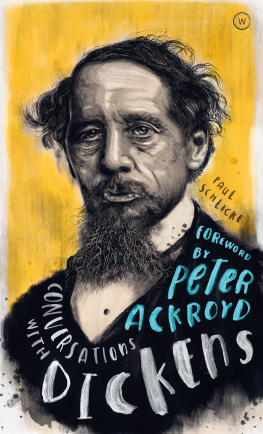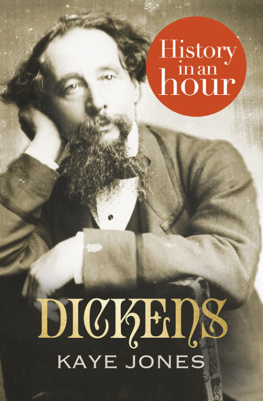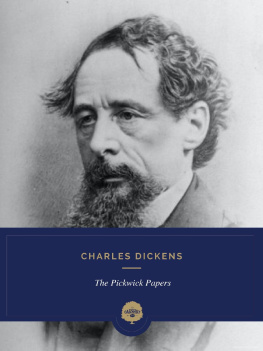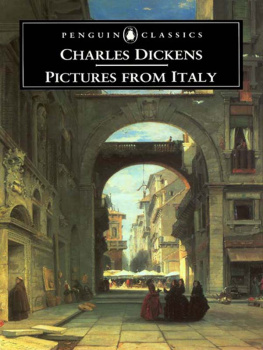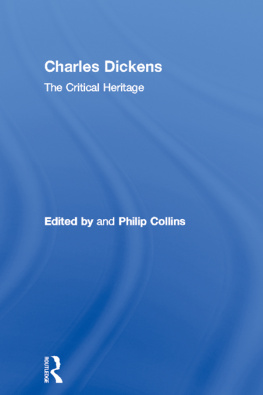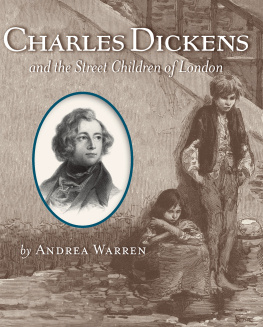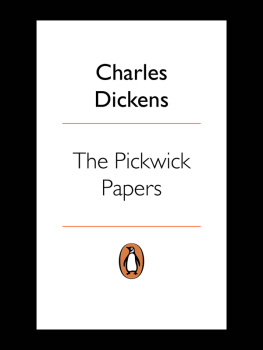

Originally published under the title Dickens...Off the Record 2008
This edition first published in the UK and USA 2019 by
Watkins, an imprint of Watkins Media Limited
Unit 11, Shepperton House
8993 Shepperton Road
London
N1 3DF
Design and typography copyright Watkins Media Limited 2019
Text copyright Paul Schlicke 2008, 2019
Foreword copyright Peter Ackroyd 2008, 2019
Paul Schlicke has asserted his right under the Copyright, Designs and Patents Act 1988 to be identified as the author of this work.
All rights reserved.
No part of this book may be reproduced or utilized in any form or by any means, electronic or mechanical, without prior permission in writing from the Publishers.
10 9 8 7 6 5 4 3 2 1
Typeset by JCS Publishing Services Ltd
Printed and bound by TJ International Ltd, Padstow, Cornwall
A CIP record for this book is available from the British Library
ISBN: 978-1-78678-248-9
www.watkinspublishing.com
Learn about key figures in science, spirituality, art and literature through revealing dialogues based on established fact. Written by a fantastic collection of authors and foreword writers gathered together to delve into the lives and achievements of some of the worlds greatest historical figures, this series is perfect for anyone looking for a quick and accessible introduction to the subject.
OTHER TITLES IN THE SERIES
Published
Conversations with JFK by Michael O'Brien;
Foreword by Gore Vidal
Conversations with Oscar Wilde by Merlin Holland;
Foreword by Simon Callow
Conversations with Casanova by Derek Parker;
Foreword by Dita Von Teese
Forthcoming
Conversations with Buddha by Joan Duncan Oliver; Foreword by Annie Lennox
Conversations with Galileo by William Shea; Foreword by Dava Sobel
Paul Schlicke, Senior Lecturer in English at the University of Aberdeen, has served as President of the Dickens Society of American and the International Dickens Fellowship. He is currently chairman of the Board of Trustees of the Charles Dickens Museum in London.
Peter Ackroyd is a renowned novelist, critic and biographer. He has written 13 novels, including Hawksmoor, The Fall of Troy and Chatterton, which was shortlisted for the Booker Price in 1987. His biographies include works on Dickens, William Blake and Shakespeare.
CONTENTS
FOREWORD BY PETER ACKROYD
Interviewing Dickens would be a challenging, if not unnerving, experience. You would have to be precisely on time. Dickens abhorred lateness of any kind, and would remonstrate with anyone who arrived even two or three minutes after the stated appointment. As soon as you had been ushered into his presence, he would jump up from his chair and shake you vigorously by the hand before uttering his familiar greeting, How do you do? I am very glad to see you. There was about him an atmosphere of overwhelming energy. But he could also be tender as tender as a woman, as one contemporary put it. And he would immediately put any interlocutor at ease.
Dickens had a brisk, emphatic manner of talking. He emphasized certain words in a slightly theatrical manner perhaps derived from his ubiquitous public readings, but he also had a slight burr or thickness in his voice that was sometimes mistaken for a lisp. Some people noticed a metallic quality in his delivery, perhaps connected with his prolonged life in the city. He never had a cockney accent, nor a rural one: he had the strange, flat, hybrid London voice.
In appearance, Dickens was more distinctive. He always wore resplendent colours, abhorring the familiar black of the middle-class male. In obedience to his injunction always to Brighten it! Brighten it! he might be wearing a scarlet waistcoat, bottle-green jacket and garishly checked trousers. In middle age he looked much older than he really was, having been wearied by a life to which he had contributed the work and energy of ten men. No writer ever laboured so hard or with such determination.
And what would you talk about in this conversation with Dickens? He ranged over a variety of topics and themes very quickly. If you uttered a word that appealed to him, he would snatch at it and repeat it. Yes, he would say, Thats it! He would abruptly change the subject. He spoke in a sharp and jerky manner, and gave the impression of a nervous, abrupt and excitable man. He would gesticulate freely not at all in the English manner and would rise from his chair to walk up and down the room.
Dickens had certain favourite phrases, among them Oh lor no! and God bless my soul! When he was listening to you, he would nod his head and often repeat Surely or Certainly, and he had a habit of interrupting your remarks with the compliment, Capital, capital! He laughed freely and often; under the right circumstances, too, he was quick to turn the conversation in a comic direction. Everyone testified to the fact that he was altogether without grandeur or hauteur. You never felt that you were in the company of a great author, but rather in the presence of an engaging and sympathetic man. He was a good listener. He was genial and responsive.
In his writing and in his career, Dickens became a giant symbol of 19th-century London and of Victorian society in general. In his brooding melancholy and in his broad humour, he represented the two great currents of English feeling; in his energy and optimism he embodied all the progress of the age; and in his fight for social reform he gave voice to all the progressive tendencies of his time.
And so, let your encounter with Charles Dickens now begin.

INTRODUCTION
Charles Dickens was the 19th-century equivalent of a pop star. The Inimitable, he called himself and he was. Before the days of radio, cinema, television and the Internet, he attracted international adulation on an unprecedented scale. His first novel, The Pickwick Papers, written when he was only 24 years old, was a publishing sensation, going through multiple editions, abridgments, translations, adaptations, dramatizations and spin-offs throughout the century. Four years after this first hit, the serialized parts of the tale of Little Nell in The Old Curiosity Shop attracted sales of over 100,000 copies a week as the story reached its climax. In 1841, while still in his twenties, Dickens was granted the freedom of Edinburgh. The following year, huge crowds gathered to honour him when he toured the United States. Three thousand people attended a Boz Ball (the title celebrated his pseudonym) in New York City. I cant tell you what they do here to welcome me, Dickens wrote home to his brother Frederick, or how they cheer and shout on all occasions in the streets in the Theatres within doors and wherever I go.
With his long hair and outrageous waistcoats, Dickens played the role to the hilt. He cultivated a persona of genial intimacy with his readers, and built upon it by touring Britain, Ireland and America, giving readings from his works. When he died, there was public mourning, and his admirers felt that they had lost a personal friend. However, he concealed aspects of his life from his public his long-term relationship with the actress Ellen Ternan, 27 years his junior, was still a secret more than half a century after his death. And to this day, we dont know for sure what the nature of that relationship was. From a modern viewpoint, its inconceivable that they were not lovers, but Dickens idealized virginal young women, and a new anguish of unrequited love entered his last novels. It is at least possible that the relationship was never consummated.
Next page
